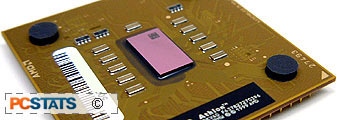Overclockers Delight?
The chip we are testing here is based on the AQXEA stepping, and was
manufactured in week 34 of 2003. There's a rumor going around that week 39
or later Barton's are multiplier locked in a way that unlocking them in a tradition
sense is impossible. We cannot comment on that, but our processor was unlocked, of
course, seeing as it was built before week 39.
One area
where AMD has made great progress in is the quality of cooling
that they are now bundling with their processors. Any early Socket A Athlon user
will tell you how horrible those old retail heatsinks were - in fact often
they were often just barely adequate to cool the processor at stock speeds. It
seems that AMD listened the the cries from their customers, and took measures to improve the
quality of the heatsinks bundled with their processors.
 Enthusiasts tend to really like the AthlonXP because
it is just so much fun to play with! Having the ability to change the
processor's multiplier allows one to come up with an almost endless combination
of speeds... And depending on what applications are used, and what hardware is
in the PC, it's nice to know that you can really push your processor to its
absolute limit. Enthusiasts tend to really like the AthlonXP because
it is just so much fun to play with! Having the ability to change the
processor's multiplier allows one to come up with an almost endless combination
of speeds... And depending on what applications are used, and what hardware is
in the PC, it's nice to know that you can really push your processor to its
absolute limit.
Installing the AthlonXP 2500+ into the Albatron KX18D-Pro II based
test system, we had some high hopes in terms of overclocking. I've heard that 2.2-2.4
GHz is easily achievable with air cooling, so let's see how well we
do.
As the AthlonXP 2500+
processor is multiplier unlocked, I decided to raise the multiplier first. First 11.5x, 12x, and
12.5x with out any problems. I could even access multipliers higher then 12.5x thanks to the nForce2
chipset, but unfortunately the AthlonXP 2500+ was not up the task. Anything higher than a
13x multiplier and the system BSOD while booting WindowsXP.
Next we started to raise the FSB.
The system maxed out at a rather unimpressive 170 MHz FSB, which gave us a
total clock speed of 2.21 GHz. Now for some benchmarks.
 |
| PCStats Test System #1 Specs: |
| processor: |
intel pentium 4 3.2 ghz
athlon64 3200+
athlonxp
3200+
athlonxp 2500+ |
| clock
speed: |
11 x 166 mhz = 1.83 ghz
13 x 170 mhz = 2.21
ghz |
| motherboards: |
intel d875pbz
msi k8t neo
albatron kx18d pro ii |
| videocard: |
ati radeon 9800 pro |
| memory: |
2x 512mb ocz el pc4200 |
| hard drive:
|
20gb western digital 7200 rpm
hdd |
| cdrom: |
nec 52x cd-rom |
| powersupply: |
pc power & cooling 510w |
| software
setup |
windowsxp build 2600
intel inf 5.03
via 4in1 4.49
nforce
3.13
catalyst 3.7 |
| workstation
benchmarks |
sysmark2002
business winstone 2002
content creation
2002
superpi
povray
sciencmark 2.0
sisoft sandra
2003
pcmark2002
3dmark2001se
quake iii
arena
ut2003 | |
|
